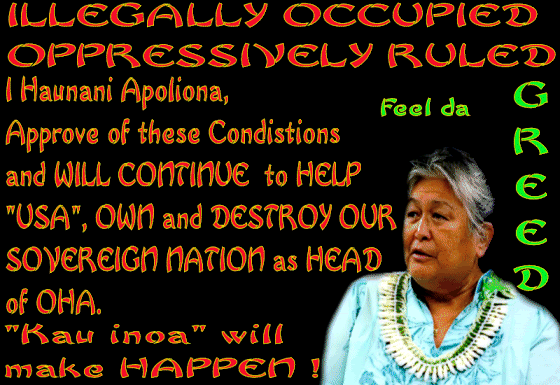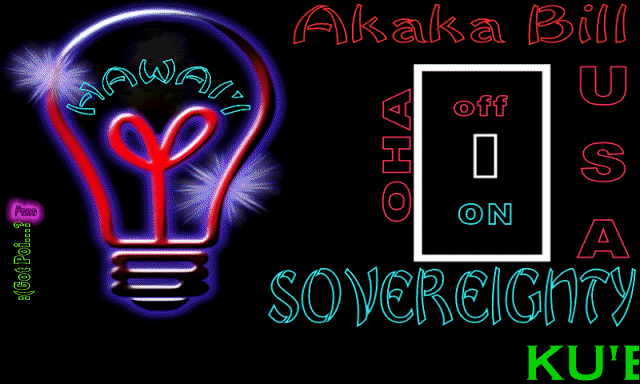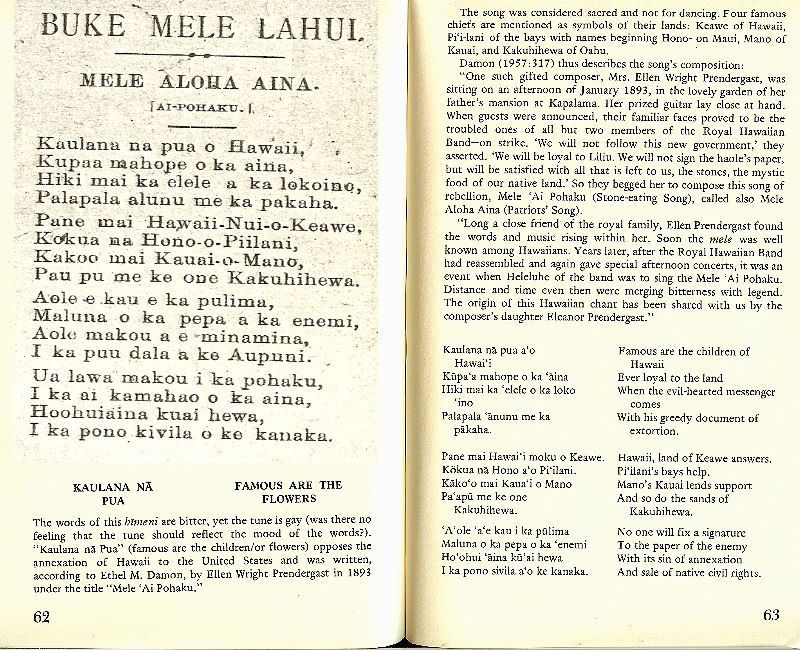



 Visitation for kumu hula John Kealamaka'ainana Lake, who devoted his life to preserving native language and traditions, and died May 14 at age 70, will be held at 5 p.m. Friday at Mystical Rose Chapel at Chaminade University. A service will follow at 6:30 p.m. A second visitation will be held at 9 a.m. Saturday, with a Mass following at 11:30 a.m. Burial will be held at 12:30 p.m. June 2 at Maui Memorial Park.Lake was a master chanter, kumu hula, author, researcher, educator and lecturer who retired from full-time teaching at Saint Louis School in 1992.He is survived by wife, Barbara; children, John "Kekoa," Naomi "Sissy" Lake-Farm and Joshua; hanai son, John Molitau; five grandchildren; and sisters, Joan Kealohaokalani Lake-Farren and Miriam Keawepoepoe Lake.HONOLULU — A Maui native praised as “one of the great human beings of our time” died Wednesday on Oahu.John Keolamaka‘ainanakalahuio-kalanikamehameha‘ekolu Lake — kumu hula of Halau Mele, 32-year educator at St. Louis School in Honolulu and spiritual guide to Hawaiian Canoe Club of Kahului — succumbed to cancer of the larynx at 7:20 a.m. at Straub Clinic & Hospital, family members said. He was 70.“With the passing of dad, all this means is that our work truly continues, and he has left us definitely with the idea of hooilina, or established legacies,” his daughter, Sissy Lake-Farm of Central Maui, said by phone Wednesday from the family home in Kaimuki, Oahu.“He has established a firm foundation. . . . All that he has taught and done and has contributed will continue and will flourish,” she said.She and her hanai brother, Kapono‘ai Molitau, as co-kumu hula of halau Na Hanona Kulike ‘O Pi‘ilani had planned to honor Lake at an event Saturday in Wailuku. The Ho‘oilina (legacy) concert was set to salute the legacies of four Maui families, those of kumu hula Nona Beamer of Lahaina, ki hoalu artist Kevin Brown of Waiehu and singer Emma Veary of Pukalani along with Lake. Two honorees have died within one month of each other — Beamer died April 10 at age 84 — but the show will go on.“Yes, it’s a sad day for Hawaii today, but on Saturday during the concert, it will be a celebration of his life,” Lake-Farm said. “We’re excited to pay tribute to him and to Aunty Nona and all of our kupuna that have gone before us.”John Lake was born Oct. 11, 1937, in Wailuku to John Matthew Lake of Wailuku and Naomi Serepta Kealoha Kaluakini Lake of Kaupo, considered the co-founders of Hawaiian Canoe Club.An alumnus of St. Anthony High School in Wailuku, John Keola Lake graduated from the University of San Francisco and earned a master’s degree in linguistics from the University of Valencia in Spain.Upon returning to Hawaii, he founded the St. Louis School Hawaiian studies program, taught Hawaiian language at Chaminade University and also instructed at Kapiolani and Windward community colleges.His wide-ranging community involvement includes service on the Kaho‘olawe Island Reserve Commission; as protocol adviser to the Bishop Museum; as an Office of Hawaiian Affairs grants evaluator; and on the National Park Service advisory council to Pu‘u Kohola heiau on Hawaii island. He was also a member of the State Foundation on Culture and the Arts, State Council on Hawaiian Heritage and Hawaii Alliance for Art Education, and a director of the Natural History Association.Lake was the recipient of a raft of honors, including Outstanding Hawaiian by the State of Hawaii in 1980, Living Treasure of Hawaii by Honpa Hongwanji in 1987, Kukui Malama Award of OHA in 1993, and Na Makua Award from Brigham Young University in 1984. He is credited with two publications: “Survey on Traditional Music and Dance” in the mid-1970s, and “‘Olelo Hou: Basic Hawaiian Conversation” in 1987.On Wednesday, Maui residents remembered Lake as a teacher, mentor and cultural practitioner of pervasive influence over several generations and into the future. Keli‘i Tau‘a of Halau Maui Nui O Kama said he and Lake were in the original group of students trained to uniki, or graduate, as kumu hula under the aegis of the late hula master Maiki Aiu Lake.“Very few were on the level he was on, not only as an educator . . . in an institute such as St. Louis School, but also as a kumu hula, as a community person and as one of, I believe, five kupuna who put together the return to Pu‘u Kohola,” said Tau‘a.“He was loved by all,” he added.Native Hawaiian activist Ke‘eaumoku Kapu of West Maui said he served with Lake on the six-member Council of Chiefs at Pu‘u Kohola heiau, where Lake was the longtime kahuna nui, or high priest.“He’s definitely an icon,” Kapu said, “one of the treasures that definitely will be lost in Lahaina because of the Lake family relation to this place.“We’re losing one of the greatest inspirations, but he will still live on in the generations that he has ‘infected’ (energized),” he said.Sam Kaha‘i Ka‘ai of Haiku serves as ‘ielemakua, or distinguished elder, of Pu‘u Kohola.“It’s a joyful time to have known him, and we celebrate all his sharing and guidance,” Ka‘ai said. “Most people look at the sad loss, but I look at the great light that he spread in the students and the schools. He was one of those people who had European modern religion and yet understood the spirit of poe kahiko (traditional people); each has aloha and governance with Akua (God). . . . We will miss him because of his wisdom and his great love, but we will not forget.“He is one of the great human beings of our time,” he concluded.Attorney Diane St. Sure Ho, who is head coach of Hawaiian Canoe Club, called Lake’s statewide impact “immeasurable” and said club officials had sought his counsel, noting that “his insight would always be so Hawaiian and so simple, always back to the basics.”“He himself is probably the most Hawaiian man I’ve ever known. He’s the essence of what we think that Hawaiian is. People talk about values, but he just lived it (in) how he conducted himself in all kinds of situations,” she said.Lake is survived by his wife, Barbara Ellen Pualani Kahaka Lake of Kaimuki; two sons, John Maximin Kekoaali‘iokahekili Lake of Kaimuki and Joshua Matthew Iwikauikauakukuiaikaawakea (Stephanie Canda) Lake of Makiki, Oahu; a daughter, Naomi “Sissy” Katherine Kahakuhaupiokamakani (Kyle Elama Farm) Lake-Farm of Waiehu Kou; a hanai son, John Kapono‘aikaulikekeao (Jennifer Perkins) Molitau of Wailuku; two sisters, Miriam Keawepoepoe Lake of Wailuku and Joan Kealohalani Lake Farren of Las Vegas; and four grandchildren.The family is planning memorial services on Oahu, with burial on Maui.On the eve of Saturday’s Ho‘oilina concert, Art Fillazar recalled that for David Malo Day at Lahainaluna High School, Lake had served three years as volunteer kumu hula and had composed a song for the occasion in 1992.Fillazar, Lahainaluna student activities coordinator, described the composition as “a very beautiful, very moving, simple song of thanksgiving. . . . Since then we have sung that song at every major school event. It oftentimes brings tears to the eyes of the audience — chicken sing, as they say.”The song contains thoughts of pride — and possibly of farewell to a great Maui son:O kou aloha ka ikena akuI ka hana la loA pono e haeleolu i loko o ke wa.Hele aku ai kuponoHo‘oheno mau ke la‘Ikela maula makou e.In English:Your love is great for all the things gone byIt’s time to move on softlyAnd it’s only time.As we move forward we will cherishWhat we know will always continueAnd we’ll be there.• Kekoa Enomoto can be reached at kekoa@mauinews.com.
Visitation for kumu hula John Kealamaka'ainana Lake, who devoted his life to preserving native language and traditions, and died May 14 at age 70, will be held at 5 p.m. Friday at Mystical Rose Chapel at Chaminade University. A service will follow at 6:30 p.m. A second visitation will be held at 9 a.m. Saturday, with a Mass following at 11:30 a.m. Burial will be held at 12:30 p.m. June 2 at Maui Memorial Park.Lake was a master chanter, kumu hula, author, researcher, educator and lecturer who retired from full-time teaching at Saint Louis School in 1992.He is survived by wife, Barbara; children, John "Kekoa," Naomi "Sissy" Lake-Farm and Joshua; hanai son, John Molitau; five grandchildren; and sisters, Joan Kealohaokalani Lake-Farren and Miriam Keawepoepoe Lake.HONOLULU — A Maui native praised as “one of the great human beings of our time” died Wednesday on Oahu.John Keolamaka‘ainanakalahuio-kalanikamehameha‘ekolu Lake — kumu hula of Halau Mele, 32-year educator at St. Louis School in Honolulu and spiritual guide to Hawaiian Canoe Club of Kahului — succumbed to cancer of the larynx at 7:20 a.m. at Straub Clinic & Hospital, family members said. He was 70.“With the passing of dad, all this means is that our work truly continues, and he has left us definitely with the idea of hooilina, or established legacies,” his daughter, Sissy Lake-Farm of Central Maui, said by phone Wednesday from the family home in Kaimuki, Oahu.“He has established a firm foundation. . . . All that he has taught and done and has contributed will continue and will flourish,” she said.She and her hanai brother, Kapono‘ai Molitau, as co-kumu hula of halau Na Hanona Kulike ‘O Pi‘ilani had planned to honor Lake at an event Saturday in Wailuku. The Ho‘oilina (legacy) concert was set to salute the legacies of four Maui families, those of kumu hula Nona Beamer of Lahaina, ki hoalu artist Kevin Brown of Waiehu and singer Emma Veary of Pukalani along with Lake. Two honorees have died within one month of each other — Beamer died April 10 at age 84 — but the show will go on.“Yes, it’s a sad day for Hawaii today, but on Saturday during the concert, it will be a celebration of his life,” Lake-Farm said. “We’re excited to pay tribute to him and to Aunty Nona and all of our kupuna that have gone before us.”John Lake was born Oct. 11, 1937, in Wailuku to John Matthew Lake of Wailuku and Naomi Serepta Kealoha Kaluakini Lake of Kaupo, considered the co-founders of Hawaiian Canoe Club.An alumnus of St. Anthony High School in Wailuku, John Keola Lake graduated from the University of San Francisco and earned a master’s degree in linguistics from the University of Valencia in Spain.Upon returning to Hawaii, he founded the St. Louis School Hawaiian studies program, taught Hawaiian language at Chaminade University and also instructed at Kapiolani and Windward community colleges.His wide-ranging community involvement includes service on the Kaho‘olawe Island Reserve Commission; as protocol adviser to the Bishop Museum; as an Office of Hawaiian Affairs grants evaluator; and on the National Park Service advisory council to Pu‘u Kohola heiau on Hawaii island. He was also a member of the State Foundation on Culture and the Arts, State Council on Hawaiian Heritage and Hawaii Alliance for Art Education, and a director of the Natural History Association.Lake was the recipient of a raft of honors, including Outstanding Hawaiian by the State of Hawaii in 1980, Living Treasure of Hawaii by Honpa Hongwanji in 1987, Kukui Malama Award of OHA in 1993, and Na Makua Award from Brigham Young University in 1984. He is credited with two publications: “Survey on Traditional Music and Dance” in the mid-1970s, and “‘Olelo Hou: Basic Hawaiian Conversation” in 1987.On Wednesday, Maui residents remembered Lake as a teacher, mentor and cultural practitioner of pervasive influence over several generations and into the future. Keli‘i Tau‘a of Halau Maui Nui O Kama said he and Lake were in the original group of students trained to uniki, or graduate, as kumu hula under the aegis of the late hula master Maiki Aiu Lake.“Very few were on the level he was on, not only as an educator . . . in an institute such as St. Louis School, but also as a kumu hula, as a community person and as one of, I believe, five kupuna who put together the return to Pu‘u Kohola,” said Tau‘a.“He was loved by all,” he added.Native Hawaiian activist Ke‘eaumoku Kapu of West Maui said he served with Lake on the six-member Council of Chiefs at Pu‘u Kohola heiau, where Lake was the longtime kahuna nui, or high priest.“He’s definitely an icon,” Kapu said, “one of the treasures that definitely will be lost in Lahaina because of the Lake family relation to this place.“We’re losing one of the greatest inspirations, but he will still live on in the generations that he has ‘infected’ (energized),” he said.Sam Kaha‘i Ka‘ai of Haiku serves as ‘ielemakua, or distinguished elder, of Pu‘u Kohola.“It’s a joyful time to have known him, and we celebrate all his sharing and guidance,” Ka‘ai said. “Most people look at the sad loss, but I look at the great light that he spread in the students and the schools. He was one of those people who had European modern religion and yet understood the spirit of poe kahiko (traditional people); each has aloha and governance with Akua (God). . . . We will miss him because of his wisdom and his great love, but we will not forget.“He is one of the great human beings of our time,” he concluded.Attorney Diane St. Sure Ho, who is head coach of Hawaiian Canoe Club, called Lake’s statewide impact “immeasurable” and said club officials had sought his counsel, noting that “his insight would always be so Hawaiian and so simple, always back to the basics.”“He himself is probably the most Hawaiian man I’ve ever known. He’s the essence of what we think that Hawaiian is. People talk about values, but he just lived it (in) how he conducted himself in all kinds of situations,” she said.Lake is survived by his wife, Barbara Ellen Pualani Kahaka Lake of Kaimuki; two sons, John Maximin Kekoaali‘iokahekili Lake of Kaimuki and Joshua Matthew Iwikauikauakukuiaikaawakea (Stephanie Canda) Lake of Makiki, Oahu; a daughter, Naomi “Sissy” Katherine Kahakuhaupiokamakani (Kyle Elama Farm) Lake-Farm of Waiehu Kou; a hanai son, John Kapono‘aikaulikekeao (Jennifer Perkins) Molitau of Wailuku; two sisters, Miriam Keawepoepoe Lake of Wailuku and Joan Kealohalani Lake Farren of Las Vegas; and four grandchildren.The family is planning memorial services on Oahu, with burial on Maui.On the eve of Saturday’s Ho‘oilina concert, Art Fillazar recalled that for David Malo Day at Lahainaluna High School, Lake had served three years as volunteer kumu hula and had composed a song for the occasion in 1992.Fillazar, Lahainaluna student activities coordinator, described the composition as “a very beautiful, very moving, simple song of thanksgiving. . . . Since then we have sung that song at every major school event. It oftentimes brings tears to the eyes of the audience — chicken sing, as they say.”The song contains thoughts of pride — and possibly of farewell to a great Maui son:O kou aloha ka ikena akuI ka hana la loA pono e haeleolu i loko o ke wa.Hele aku ai kuponoHo‘oheno mau ke la‘Ikela maula makou e.In English:Your love is great for all the things gone byIt’s time to move on softlyAnd it’s only time.As we move forward we will cherishWhat we know will always continueAnd we’ll be there.• Kekoa Enomoto can be reached at kekoa@mauinews.com.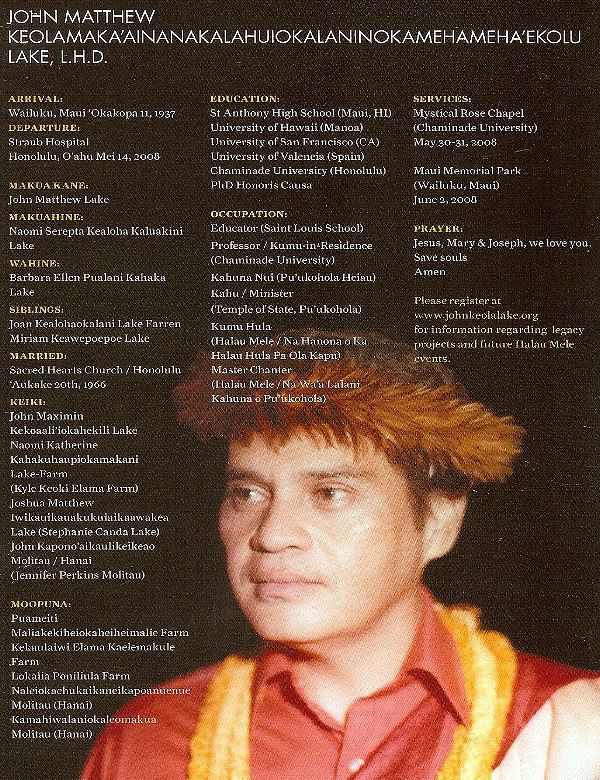 John Kaimikaua -- Story, Chant And Dance Of Hula's OriginsKeeping The Old Ways Alive-A Visit With Kumu John Keola Lake
John Kaimikaua -- Story, Chant And Dance Of Hula's OriginsKeeping The Old Ways Alive-A Visit With Kumu John Keola Lake
May 13, 2008 Aloha mai kakou (greetings): The recent activities of certain individuals calling themselves the "Hawaiian Kingdom government" who temporarily took control of the `Iolani Palace grounds have caused an overwhelming number of emails to our account, voicing support, abhorrence, as well as honest inquiries. The writers of these emails have mistakenly assumed that these individuals are part of the acting Government of the Hawaiian Kingdom. Therefore, in order to remedy this confusion and misunderstandings we feel the need to make the following statement. The individuals calling themselves the "Hawaiian Kingdom government" are not in any way affiliated with the acting government of the Hawaiian Kingdom. The acting Government of the Hawaiian Kingdom was established in 1995 to provisionally represent the Hawaiian state, which has been a subject of international law since being recognized in 1843. The acting Government of the Hawaiian Kingdom was established not as a permanent legal entity, but rather as a provisional government under the principle of "necessity." This is the norm in cases of occupation. Due to the fact of occupation, acting governments do not and cannot represent the nationals of an occupied state. It can provisionally represent only the state, which is the subject of international law. Thus the term "acting" and not "permanent." Under the principle of necessity, the acting Government of the Hawaiian Kingdom must adhere strictly to the constitution and laws of the Hawaiian Kingdom as it stood prior to the landing of the U.S. troops on 16 January 1893. These laws of the Hawaiian Kingdom are those that existed before the bayonet constitution of 1887, which was the start of the revolution that eventually caused the illegal landing of United States troops in 1893. Any failure to strictly adhere to the legal order could result in legal liability. If the acting Government of the Hawaiian Kingdom fails to do so, it could stand trial for the willful violation of Hawaiian law when the government is lawfully restored. An acting government is very limited in what it may and may not do. Recognized doctrine on necessity (Mitchell and Other v. Director of Public Prosecutions and Another [1986] L.R.C. 35, 88-89) provides the following limitations and the authority of an acting government:
As a matter of international law, a law between independent states, the sovereignty of the Hawaiian Kingdom was not extinguished when the United States unilaterally seized the Hawaiian Islands by a Congressional joint resolution during the Spanish-American War. Since then, Congressional legislation have been imposed in Hawai`i without first acquiring Hawai`i's sovereignty by either a treaty of cession or conquest. In fact, there were two attempts by the U.S. to acquire Hawai`i's sovereignty by treaties of cession, the first signed on February 14, 1893 and the other on June 16, 1897. The first treaty failed as a result of a Presidential investigation into the illegal overthrow of the Hawaiian Kingdom government, and the second failed as a result of protests by the late Queen Lili`uokalani and loyal Hawaiian subjects. Since 1898, the United States has treated the Hawaiian Islands as if it were annexed by cession and made a part of its territory. The notion that an independent state's sovereignty can be acquired by enacting a legislative joint resolution is to also believe in the idea that the British Parliament today could enact a British statute annexing the United States in order to reestablish the thirteen colonies. The legislation of every country has no legal effect beyond its own territory. Not only did the Hawaiian Kingdom have over ninety legations (embassies) and consulates throughout the world in 1893, it had a legation in Washington, D.C., and consul generals in New York and San Francisco, as well as several international treaties with the United States. Hawai`i was not an American colony. Similar to the occupation of the Baltic States (Latvia, Lithuania, and Estonia) by Soviet Russia in 1940 for Russian naval access to the Baltic ports, Hawai`i, as a neutral state, was illegally occupied during the Spanish-American war for naval access to Pearl Harbor, as well as Hawai`i's strategic location in the middle of the Pacific ocean. The situation today is governed by the international laws of occupation whereby the United States, as the occupying state, is mandated to administer the laws of the Hawaiian Kingdom, the occupied state. The fact that the U.S. has not complied with international law does not render international law void, but rather persuasive evidence of the violation itself. The organization calling itself the Hawaiian Kingdom Government, organized themselves without any basis in Hawaiian constitutional law. This is a very dangerous game to play, no matter how honest the intent, because it could be a violation of Hawaiian law itself and the international law of occupation. Other groups, as well, have also drawn up their own constitutions without first understanding the foundation of Hawaiian Kingdom constitutional and statutory law. Amnesia of Hawaiian state sovereignty, as a matter of international law, and Hawaiian Kingdom laws have become so pervasive that colonization and decolonization, as social and political theories, have dominated the scholarly work of lawyers, political scientists and activists regarding Hawai`i. This theoretical framework wrongly assumes that native Hawaiians are an indigenous group of people with a right to self-determination, rather than the majority of the citizenry of an already existing sovereign, but occupied, state. The acting Government of the Hawaiian Kingdom is not part of the sovereignty movement or in any way affiliated with the worldwide indigenous peoples movement and self-determination. It operates on the legal presumption that Hawaiian sovereignty remains vested in the Hawaiian state, and therefore does not seek the de facto or de jure recognition of its sovereignty. Therefore, the acting Government of the Hawaiian Kingdom does not promote or support secession from the United States, because there exists no evidence of cession of Hawaiian sovereignty to the United States in the first place. Rather, Hawai`i was occupied by the United States for military purposes—a legal situation somewhat like the German occupation of Luxembourg and the Soviet occupation of the Baltic states during World War II, or the current United States occupation of Iraq. Regarding claims by individuals to the Hawaiian Throne, it is a matter and subject of Hawaiian Kingdom constitutional law and does not depend on who may have the genealogy of certain Hawaiian chiefs. In 1917, Queen Lili`uokalani died without a proclaimed successor to the throne. The situation was similar to when King Kamehameha V died on December 11, 1872, and King Lunalilo on February 3, 1874. In those cases, the legislature was convened to "elect by ballot some native Ali`i of the Kingdom as Successor to the Throne," in accordance with Article 22 of the 1864 constitution. Because an election has not taken place since the death of Queen Lili`uokalani, the only way of establishing an acting government under the doctrine of necessity would be through a Council of Regency, which is established under Article 33. A Regent is not a monarch, and, by definition, temporarily serves in the absence of a Monarch. Our purpose is to educate Hawai`i and the world community as to the legal history of the Hawaiian Kingdom, the international law of occupation, and its profound impact it has today on law, politics and the economy. After returning from international arbitral proceedings in the Larsen v. Hawaiian Kingdom case at the Permanent Court of Arbitration, The Hague, Netherlands, and the filing of the Hawaiian Complaint at the United Nations Security Council on July 5, 2001, the acting Council of Regency decided that I should pursue a Ph.D. in Political Science at the University of Hawai`i at Manoa to continue to expose the legal and political history of the Hawaiian Kingdom, the international arbitration proceedings, and the complaint filed with the United Nations Security Council. By entering graduate studies, it was thought that I should further develop my skills in international law and politics, as well as Hawaiian Kingdom constitutional and administrative law. Political Science teaches the foundations of international relations, political theory, and public law. The acting Government of the Hawaiian Kingdom also retained Professor Matthew Craven, Dean of the University of London (SOAS) Law Department, in 2002 to do a legal brief on whether or not the sovereignty of the Hawaiian Kingdom was extinguished by the United States. He found no evidence of extinguishment. I have taught courses, both at the undergraduate and graduate levels, on these topics under the disciplines of Political Science, Anthropology and Hawaiian Studies, and others have also been teaching these topics in the same departments as well as the Department of Geography. In 2003, the Hawaiian Society of Law & Politics was established as a student organization at the University of Hawai`i at Manoa to "promote the development of curriculum on the subject of Hawaiian statehood under international law for the University of Hawai`i." The Society has successfully put on two academic symposiums and publishes the Hawaiian Journal of Law & Politics. Kamehameha Publishing will publish a book with five select articles from volumes 1 and 2 of the Hawaiian Journal of Law & Politics, which will include my article titled "American Occupation of the Hawaiian State: A Century Unchecked." I plan to complete my Ph.D. in the Fall '08 on the topic of the continued existence of the Hawaiian Kingdom, and the role of Hawaiian constitutional and administrative law and the international law of occupation. I will also have my first and part of my last chapter of my dissertation published in an article titled, "A Slippery Path Towards Hawaiian Indigeneity: An Analysis and Comparison between Hawaiian State Sovereignty and Hawaiian Indigeneity and its Use and Practice in Hawai`i Today," in the Journal of Law and Social Challenges (San Francisco School of Law), vol. 10, Fall '08. It is the acting government's hope that this information will clear up any misunderstandings and confusion as it works diligently to expose the illegality of the occupation of the Hawaiian Kingdom and then to ultimately bring it to an end within the framework of recognized international laws as they apply to existing sovereign states. To do this, education is crucial if not foundational. Me ka 'oia'i'o (Sincerely), David Keanu Sai, Ph.D. Candidate (Political Science) Chairman of the Council of Regency |
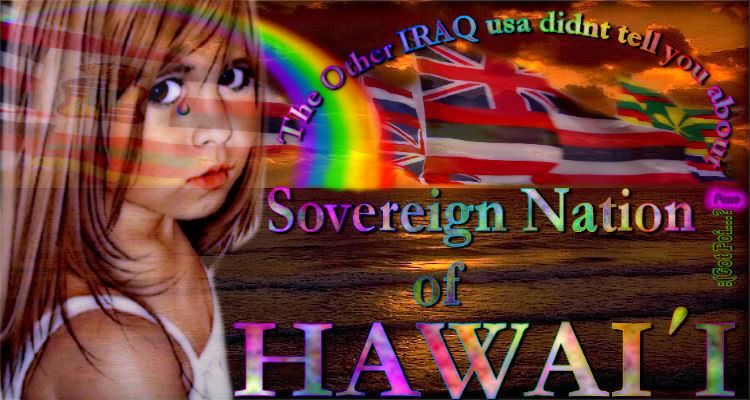 aloha kakou,I went to his "Raed Jarrar " Event on the 25th @1pm -3:30pm the AFSC's house up in Manoa and took the Video.We had a good talk Later Comparing Hawaii & IRAQ , BOTH ILLEGALLY OCCUPIED & RULED by a so called PEACEMAKER.PLEASE REPOST and SHARE THIS GUY KNOWS WHAT HE IS TALKING ABOUT!,The U.S. Role in IraqCan an occupier become a peacemaker?
aloha kakou,I went to his "Raed Jarrar " Event on the 25th @1pm -3:30pm the AFSC's house up in Manoa and took the Video.We had a good talk Later Comparing Hawaii & IRAQ , BOTH ILLEGALLY OCCUPIED & RULED by a so called PEACEMAKER.PLEASE REPOST and SHARE THIS GUY KNOWS WHAT HE IS TALKING ABOUT!,The U.S. Role in IraqCan an occupier become a peacemaker?http://afsc.org/iraq/speaking-events/The_US_Role.htm
The U.S. Role in Iraq
Can an occupier become a peacemaker?
Speaking VenuesPortland, OR Mon., May 19, 7PM Vancouver, WA Tue., May 20, 7PM Honolulu, HI Fri., May 23, 7PM Hilo, HI Mon., May 26, 6PM Kauai, HI Details TBA. Los Angeles, CA Thurs., May 29, 7:30P Public event at California State University, Los Angeles with Sonali Kolhatkar (Emcee), Ann Wright |
Raed Jarrar, who was asked by House Foreign Relations Subcommittee to coordinate a visit of Iraqi Parliamentarians to testify before Congress in June, will travel to cities across the West Coast to discuss the initiative. He will also discuss current war funding bills before Congress, the ongoing insurgent conflict, and a vision of what a constructive U.S. involvement would look like.
Background:
The U.S. strategy in Iraq is not working. Five years of occupation has led to the largest forced displacement in the Middle East since 1948 and an estimated 1 million Iraqi dead. More than 4,000 U.S. soldiers have been killed, and the US Government has spent one trillion dollars. The result has been little security and no stability for the Iraqi people.
Inside Iraq, the deterioration of basic services, including the collapse of the health care system, lack of electricity and potable water, and personal and economic insecurity make daily life for Iraqis nearly impossible. Eight million Iraqis are in need of emergency assistance, and more than one in six Iraqis have been forced from their homes. In neighboring countries absorbing refugees, infrastructure is sorely inadequate, and the economic and political strain is increasing. The chaos and violence in Iraq threaten to destabilize the whole region.
A new vision is emerging based on the complete removal of US troops and bases, Iraqi political reconciliation and regional negotiations. It is what the majority in Iraqi's Parliament and a majority of Iraqis want. The peace plan would require U.S. assistance to Syria and Jordan, which are hosting approximately 2 million Iraqi refugees, and dialogue with Iran, an important actor in Iraq.
 Raed Jarrar is an Iraqi political analyst and consultant to AFSC's Iraq Program currently based in Washington, D.C. After the U.S.-led invasion, Jarrar became the country director for CIVIC Worldwide, the only door-to-door casualty survey group in post-war Iraq. He then established Emaar, (meaning "reconstruction" in Arabic), a grassroots organization that provided humanitarian and political aid to Iraqi internally displaced persons (IDPs). Emaar delivered medicine and food as well as helped initiate micro-enterprise projects for IDPs. Additionally, Emaar engaged in political advocacy on behalf of displaced populations.
Raed Jarrar is an Iraqi political analyst and consultant to AFSC's Iraq Program currently based in Washington, D.C. After the U.S.-led invasion, Jarrar became the country director for CIVIC Worldwide, the only door-to-door casualty survey group in post-war Iraq. He then established Emaar, (meaning "reconstruction" in Arabic), a grassroots organization that provided humanitarian and political aid to Iraqi internally displaced persons (IDPs). Emaar delivered medicine and food as well as helped initiate micro-enterprise projects for IDPs. Additionally, Emaar engaged in political advocacy on behalf of displaced populations.
 |
Raed Jarrar is an Iraqi political analyst and consultant to AFSC's Iraq Program currently based in Washington, D.C. After the U.S.-led invasion, Jarrar became the country director for CIVIC Worldwide, the only door-to-door casualty survey group in post-war Iraq.
He then established Emaar, (meaning "reconstruction" in Arabic), a grassroots organization that provided humanitarian and political aid to Iraqi internally displaced persons (IDPs). Emaar delivered medicine and food as well as helped initiate micro-enterprise projects for IDPs. Additionally, Emaar engaged in political advocacy on behalf of displaced populations.
Getting Iraq to Pay More Is Not the Answer
Foreign Policy in Focus, May 2008
"Congress should stop blaming the Iraqi government for our economic woes. As our economy sputters to a halt and Congress is set to spend an additional $160 billion on the war, U.S. lawmakers are openly criticizing the Iraqi government for not paying the bills."
Read more >
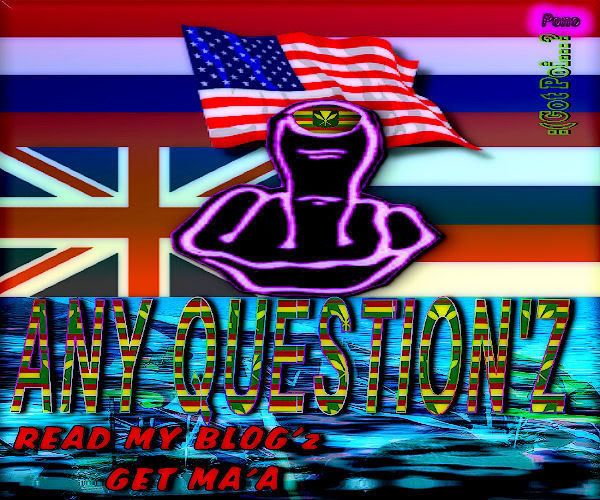

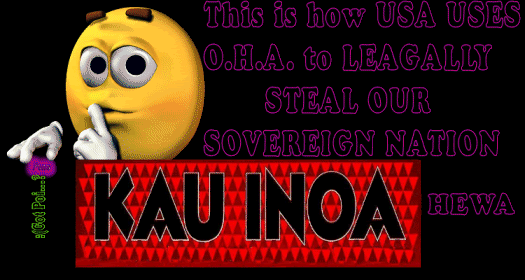 http://www.unkauinoa.org/Aloha mai kakou!What is UnKau I Noa? UnKau I Noa is an attempt to unite those who do not agree with how the project that is "Kau Inoa" is being handled. For some, Kau Inoa was a chance to receive a free shirt. For others it was the illusion that providing your explicit consent to this cause was to build a new nation. Yet, for others, Kau Inoa was that commercial you saw. The one with the singer who said "sign up....JUST BECAUSE!!!"For most, however, Kau Inoa has caused a severe case of confusion. After repeated inquiries, it has never been made clear what Kau Inoa's plan of action is in order to obtain this new nation beyond their extremely vague multi-step plan. But! By consenting and "Kau"-ing your inoa, you've given them support for whatever that action is--may it be something as simple as implementing community based "town-hall" style meetings in order to hear from our community, or may it be something as severe as implementing the heavily flawed Akaka Bill.What's that? You don't support the Akaka Bill? Well, IF that is their plan to create the new government, your name on that list does support it. The Kau Inoa website says that Kau Inoa and the Akaka Bill are not related. However, they do say that if they find Federal Recognition a.k.a. the Akaka Bill in the best interest of the "nation," they will consider it. Furthermore, their end goal is merely this NATION-LIKE group recognized by the State. Notice, NATION-LIKE. Not an independent nation. "To Build a Nation"-- Shouldn't nation building entail building an actual nation, not just a State-recognized entity?This is where UnKau I Noa comes in. Those of us who came up with this idea originally signed up for the shirt, or because it sounded like a good idea. Now...not so much. So we created our own organization to promote "nation building" amongst the most important people in this process: those who make up this nation, na Kanaka Maoli.Hopefully, if we as a community show that we don't support this, we may be able to truly unite and find a solution that EVERYONE can agree on.**For those of you who are confused, "I NOA" is not spelled incorrectly. Kau Inoa means to "place your name" (IN POOR GRAMMAR AS A MATTER OF FACT--PROPER GRAMMAR DICTATES "KAKAU I KOU INOA), but Unkau I Noa means "UnKau so that we are FREE."Yes, it is a play on the word inoa.Yes, we are that clever.Un Kau noa Tshirts are now available. These t shirts look exactly like the OHA Kau inoa shirts but have the word Un before kau inoa, and the phone number to call to get your name off the list. Same color and design. $10. Call Ed to order at- 295 1483.ORCLICK ON BANNER
http://www.unkauinoa.org/Aloha mai kakou!What is UnKau I Noa? UnKau I Noa is an attempt to unite those who do not agree with how the project that is "Kau Inoa" is being handled. For some, Kau Inoa was a chance to receive a free shirt. For others it was the illusion that providing your explicit consent to this cause was to build a new nation. Yet, for others, Kau Inoa was that commercial you saw. The one with the singer who said "sign up....JUST BECAUSE!!!"For most, however, Kau Inoa has caused a severe case of confusion. After repeated inquiries, it has never been made clear what Kau Inoa's plan of action is in order to obtain this new nation beyond their extremely vague multi-step plan. But! By consenting and "Kau"-ing your inoa, you've given them support for whatever that action is--may it be something as simple as implementing community based "town-hall" style meetings in order to hear from our community, or may it be something as severe as implementing the heavily flawed Akaka Bill.What's that? You don't support the Akaka Bill? Well, IF that is their plan to create the new government, your name on that list does support it. The Kau Inoa website says that Kau Inoa and the Akaka Bill are not related. However, they do say that if they find Federal Recognition a.k.a. the Akaka Bill in the best interest of the "nation," they will consider it. Furthermore, their end goal is merely this NATION-LIKE group recognized by the State. Notice, NATION-LIKE. Not an independent nation. "To Build a Nation"-- Shouldn't nation building entail building an actual nation, not just a State-recognized entity?This is where UnKau I Noa comes in. Those of us who came up with this idea originally signed up for the shirt, or because it sounded like a good idea. Now...not so much. So we created our own organization to promote "nation building" amongst the most important people in this process: those who make up this nation, na Kanaka Maoli.Hopefully, if we as a community show that we don't support this, we may be able to truly unite and find a solution that EVERYONE can agree on.**For those of you who are confused, "I NOA" is not spelled incorrectly. Kau Inoa means to "place your name" (IN POOR GRAMMAR AS A MATTER OF FACT--PROPER GRAMMAR DICTATES "KAKAU I KOU INOA), but Unkau I Noa means "UnKau so that we are FREE."Yes, it is a play on the word inoa.Yes, we are that clever.Un Kau noa Tshirts are now available. These t shirts look exactly like the OHA Kau inoa shirts but have the word Un before kau inoa, and the phone number to call to get your name off the list. Same color and design. $10. Call Ed to order at- 295 1483.ORCLICK ON BANNER
